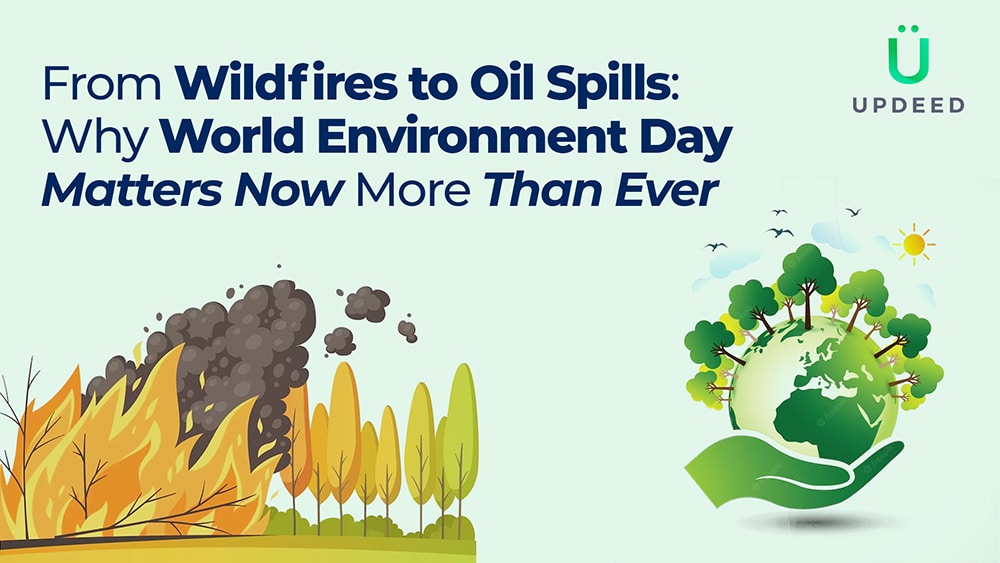From Wildfires to Oil Spills: Why World Environment Day Matters Now More Than Ever
In the face of escalating environmental crises, World Environment Day is an annual reminder of the importance of safeguarding our planet. With each passing year, the observance of this day becomes increasingly urgent as humanity grapples with a range of alarming incidents that demand immediate attention and action.
Let’s delve into recent events that emphasise the pressing need to prioritise environmental conservation and explore how individuals, communities, and governments can contribute to a sustainable future.

The State of Our Planet
As we stand on the cusp of a new era, the Earth finds itself burdened by an array of critical environmental issues. Climate change continues to wreak havoc across the globe, manifesting in the form of devastating wildfires, record-breaking heatwaves, intensified hurricanes, and rising sea levels. The scientific consensus is clear: human
activities, particularly the emission of greenhouse gases, are the primary driver of these changes.
The past year has witnessed extreme weather events that serve as a wake-up call for humanity. From the unprecedented heatwave that struck the Pacific Northwest, resulting in hundreds of fatalities, to the hurricanes that battered coastal regions, causing immense destruction and displacement, these incidents underscore the need for concerted efforts to mitigate and adapt to climate change.
Beyond climate change, deforestation and habitat destruction continue to threaten biodiversity. The loss of critical ecosystems disrupts the delicate balance of nature and deprives countless species of their homes and food sources. Recent reports of rampant deforestation in the Amazon rainforest, home to unparalleled biodiversity and a crucial carbon sink highlight the urgent need for stronger measures to curb unsustainable land use practices.
The Dangers of Pollution
Pollution, in its various forms, poses a severe threat to both the environment and human health. Air pollution, resulting from industrial emissions, vehicular exhaust, and burning fossil fuels, has been linked to a range of respiratory illnesses and premature deaths.
In cities like New Delhi, Beijing, and Mexico City, hazardous levels of air pollution have become a
grim reality, prompting governments to take drastic measures to combat this invisible menace.
Water pollution, too, remains a grave concern. Toxic chemicals, untreated sewage, and plastic waste contaminate rivers, lakes, and oceans, endangering marine life and jeopardising human access to safe drinking water.
Incidents of major oil spills, such as the one in Mauritius, where a Japanese ship ran aground and leaked thousands of tons of oil into the pristine waters, underscore the fragility of our ecosystems and the urgent need for stringent regulations to prevent such catastrophes.
The Pandemic’s Environmental Paradox
The COVID-19 pandemic, while wreaking havoc on global health and economies, has paradoxically offered a glimpse of the positive impact reduced human activity can have on the environment. During lockdowns, images of clearer skies, reduced air pollution, and wildlife reclaiming urban spaces circulated globally.
However, the pandemic has also unleashed a deluge of medical waste, single-use plastics, and discarded personal protective equipment, exacerbating the ongoing plastic pollution crisis and highlighting the need for sustainable waste management systems.
Moving Towards Solutions
World Environment Day serves as a rallying cry for action, inspiring individuals, communities, and governments to adopt sustainable practices and commit to protecting our shared planet. Here are some key steps that can help address the environmental challenges we face:
- Transition to renewable energy: Governments must accelerate the shift towards clean, renewable energy sources, such as solar and wind power, while phasing out fossil fuels. Investment in green technologies and infrastructure is crucial to achieving a sustainable energy future.
- Conservation and restoration: Protecting and restoring ecosystems, including forests, wetlands, and coral reefs, is essential for preserving biodiversity and mitigating climate change. Governments should enact and enforce stringent regulations against deforestation, promote sustainable land management practices, and establish protected areas to safeguard vulnerable species and their habitats.
- Sustainable agriculture and food systems: Transitioning towards sustainable farming practices, promoting agroecology, and reducing food waste are key components of building resilient food systems. Supporting small-scale farmers and promoting local, organic, and seasonal produce can reduce the environmental impact of agriculture while ensuring food security.
- Circular economy and waste management: Adopting a circular economy approach is crucial to moving away from the linear “take-make-dispose” model. This involves reducing waste generation, promoting recycling and reuse, and designing products for durability and recyclability. Governments should invest in waste management infrastructure and encourage the adoption of sustainable packaging alternatives.
- Education and awareness: Raising environmental awareness among individuals, especially young people, is essential for fostering a sense of responsibility towards the planet. Education systems should incorporate environmental education, promote sustainable lifestyles, and empower individuals to become environmental stewards.
- International cooperation: Addressing global environmental challenges requires collaborative efforts. Governments, organisations, and individuals must work together to share knowledge, resources, and best practices. International agreements and partnerships like the Paris Agreement are critical for coordinating global action on climate change and other environmental issues.
The day is a poignant reminder that the time to act is now. Recent incidents, from climate-related disasters to pollution crises, highlight the urgent need for collective action to protect our environment.
Governments, businesses, communities, and individuals must unite to prioritise sustainability, adopt eco-friendly practices, and advocate for policy changes that safeguard our planet.
Only through a combination of individual actions, systemic changes, and international cooperation can we hope to address the pressing environmental challenges we face.
Ready to make a positive impact in the world?
UPDEED is the place for you. Our free and open platform is filled with inspiring stories from individuals and organizations who are making a difference in their communities and beyond. Connect and collaborate with like-minded individuals from around the globe on UPDEED, and discover your own potential to create meaningful change. Join our community and make a difference.





